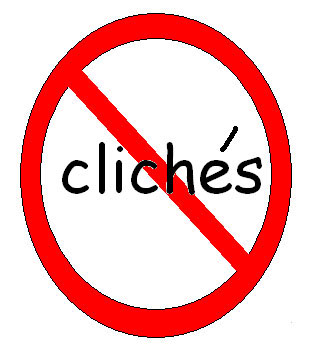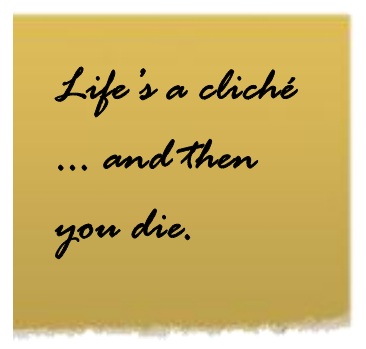We are told to avoid clichés. As writers, we are supposed to be original and thought-provoking. I suggest, however – after over a quarter of a century of devising original sentences to put end to end in original works – that nothing moves a reader more than recognition.
Seeking originality, being inventive, and coming up with a piece of writing that’s totally unique has its drawbacks. It might not be liked. Readers might not understand what you are getting at. They might not see your premise. Where you are coming from might be a place they have never visited, and so not be able to identify. Or identify with.

A clichéd premise is sometimes more successful than a completely novel principle. At the base of most popular novels is a fundamental premise we must understand. Otherwise, that story fails. So I recommend a fresh look at the cliché, and what we are taught to avoid like the plague (!)
If you pay the fiddler, you can call the tune, and these days, we are almost all doing that. Or rather, it has become vastly more simple and possible to pay your own way in the book world; make your own audience. Strut your own stuff. We can make it up, completely. The fabric of our imaginations need not stretch too far, however. It seems audiences can be regaled with the same old stories told differently. The same old archetypes can crop up, similar situations are drawn, and the old analogous plots are rehashed over and again.
And readers love it. They want more of the same, not something unique. Publishers have known this and have worked on this marketing truth for decades – give them what they want. Now what one thinks an audience wants, and what one gives them, are related; but one needn’t puzzle over it too long. The recipes have all been written.
 Recognition is one of the most powerful of emotional triggers. We secretly know this when we are moved by song lyrics that are necessarily the simplest of verses, based on the most tangible emotions. And the most complicated thing to bring off in fiction is simplicity. Do not tax yourself, as a writer, with the obstacle of originality. Aim to startle by fears that are known, desires that are identifiable, joys that are commonplace.
Recognition is one of the most powerful of emotional triggers. We secretly know this when we are moved by song lyrics that are necessarily the simplest of verses, based on the most tangible emotions. And the most complicated thing to bring off in fiction is simplicity. Do not tax yourself, as a writer, with the obstacle of originality. Aim to startle by fears that are known, desires that are identifiable, joys that are commonplace.
I will leave you with a lyric by Shel Silverstein, and after you read it, you will see what I mean.
“At the age of 37, she realised she’d never ride through Paris
In a sports car, with the warm wind in her hair…”
* * * * *
![]() Rosanne Dingli has written three original novels using recognizable archetypes. Her most recent release, Camera Obscura, deals with familiar emotions, and contains the requisite car chase. For more about Rosanne Dingli, visit her blog and her website.
Rosanne Dingli has written three original novels using recognizable archetypes. Her most recent release, Camera Obscura, deals with familiar emotions, and contains the requisite car chase. For more about Rosanne Dingli, visit her blog and her website.
[subscribe2]

Hmmm. An interesting twist on an old saw. Hey, Lin, want to add this to the list of rules we can ignore?
Interesting. I've gone through the wip looking for cliches that slipped through the net(ha)to fix with something more original. I fixed some, but a sprinkling stayed in because the cliche was part of the point.
Exactly, Carolyn – it's what I mean. If a so-called cliche seems important for the story or the sense of a paragraph, even, why let it go?
There are commonly-liked phrases and usages in fiction that are less than hackneyed and work through conscious or subconscious recognition. They play a part in how we see reading stories to be a good thing.
I think you make a very good point here, Rosanne, thanks. Most novel-length story structures are "cliches" anyway: we have to ramp up the tension and then give the resolution, and that's actually required to make almost any genre fiction story work. At the sentence and phrase level, cliches might very well be useful to get a point across simply and quickly, only I think it's vitally important that we refer to them as "easily-recognisable language items" rather than "cliches" 🙂
Phrases only become clichés when they don’t fit the context. They may be familiar thoughts or comments one has heard elsewhere and found familiar, but as long as they fit the context and offer and appropriate comment or conclusion they can be used legitimately without detracting from the quality of the writing. Indeed, if used well they can often improve the writing. It’s just when the phrase comes across as trite or lacking in real impact – the sort of thing anybody could have said rather than being from a character of substance to the story being related – that the words become clichéd.
Go through any writer’s work and you will always find a few groups of words which in other contexts would have been called clichés. But in the hands of a good writer, because they are used appropriately and sparingly, they become magical phrases that open up the whole text, that give it polish and real quality. I would cite Rosanne’s writing for this for she is a master wordsmith and, even if she uses the occasional familiar phrase, she puts her words together very carefully so that they have full impact.
Don’t write off the dear old cliché too soon. It has its place and its value. The great author’s skill comes from knowing where and when to use it. Rosanne clearly knows this.
Thank you Ian – I do try!
You turn a pretty mean phrase yourself.
But you bring up a good point about context… it's like plants, isn't it? They are only weeds when they grow in the wrong spot!
Very good points. IMHO, it's a narrow blade writers walk, when writing dialog, especially. On one had, we all speak using conversational cliches. They are part of culture. When I write dialog, for example, depending upon the period setting, I try to make the dialog sound as natural and extemporaneous as possible. That includes adding in appropriate cliches when they will connect the reader, even in asides and character's thoughts. However, I really try to eliminate them in narrative. Stephen King is one who has written sucessfully using cliches non-stop. Recpgnition seems to be very important to his approach. I had to end my reading of The Dark Tower after he actually even put one of his own titles into a scene and had a character read it and his name aloud. That's more recognition than I need, as it destroys my "suspension of disbelief".
I agree, there are only so many stories. Our job is to tell them in an appealing way.